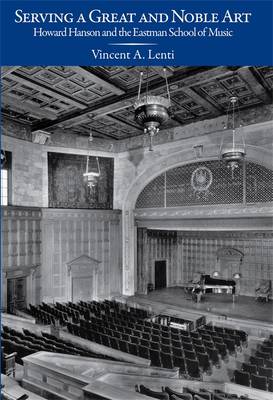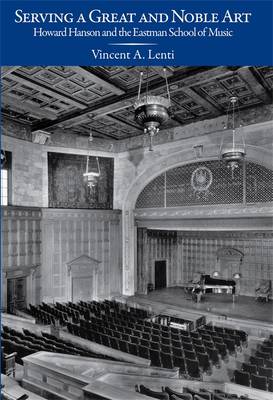
- Afhalen na 1 uur in een winkel met voorraad
- Gratis thuislevering in België vanaf € 30
- Ruim aanbod met 7 miljoen producten
- Afhalen na 1 uur in een winkel met voorraad
- Gratis thuislevering in België vanaf € 30
- Ruim aanbod met 7 miljoen producten
Zoeken
€ 34,95
+ 69 punten
Uitvoering
Omschrijving
Serving a Great and Noble Art is the second volume of the history of the Eastman School of Music, beginning in 1932 after George Eastman's death, and ending in 1972 with the resignation of the school's third director, Walter Hendl. This book is very much about Howard Hanson, director of the school from 1924 until his retirement in 1964. After forty years under Hanson's guidance, the Eastman School of Music was a near-perfect reflection of the valuesand ideals of its long-term director. Under Hanson's leadership, the school became widely known as an institution that welcomed the performer and the scholar, the composer and the educator. It was a school committed to the development of musical leadership, and above all an institution that was thoroughly American in its outlook, method, and goals. In 1945 Howard Hanson spoke of the school as "serving a great and noble art." These words provide a vivid picture of Hanson and also accurately describe his vision for the institution which, to this day, bears the unmistakable influence of his forty-year tenure as director. Hanson's successor as director, Walter Hendl, had a far less happy tenure at Eastman. A musician of great talent, his time at the Eastman School of Music ended in considerable controversy amid personal struggle. His eight years as director nonetheless witnessed many new initiatives, positivechanges, and important faculty appointments. The record of his leadership, therefore, deserving of attention and gratitude, is recounted in this volume. Vincent A. Lenti is Eastman School of Music historian, a graduateof the school (BM '60, MA '63), member of the faculty since 1963, and author of For the Enrichment of Community Life: George Eastman and the Founding of the Eastman School of Music
Specificaties
Betrokkenen
- Auteur(s):
- Uitgeverij:
Inhoud
- Aantal bladzijden:
- 368
- Taal:
- Engels
- Reeks:
- Reeksnummer:
- nr. 11
Eigenschappen
- Productcode (EAN):
- 9781580462808
- Verschijningsdatum:
- 1/09/2009
- Uitvoering:
- Hardcover
- Formaat:
- Genaaid
- Afmetingen:
- 152 mm x 229 mm
- Gewicht:
- 732 g

Alleen bij Standaard Boekhandel
+ 69 punten op je klantenkaart van Standaard Boekhandel
Beoordelingen
We publiceren alleen reviews die voldoen aan de voorwaarden voor reviews. Bekijk onze voorwaarden voor reviews.












